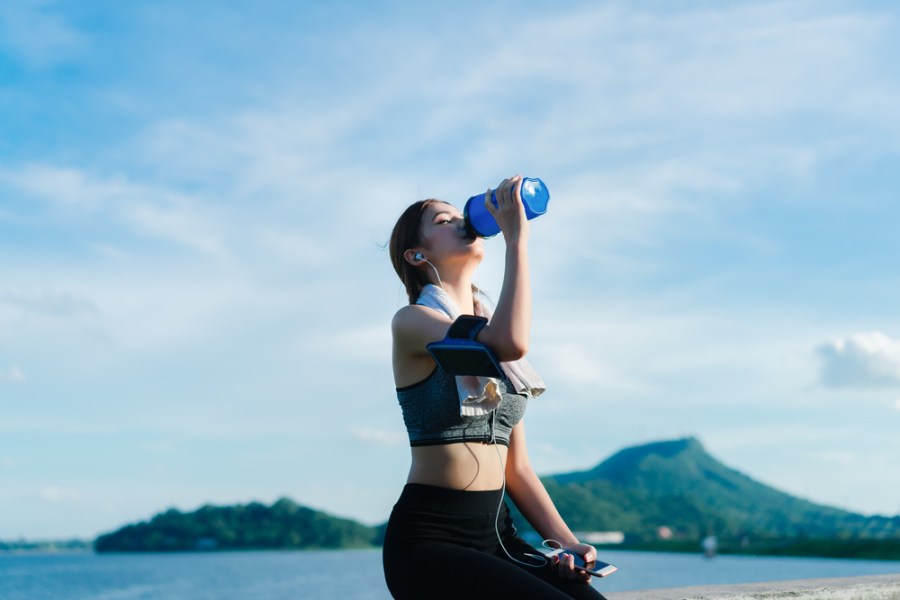Exercise is vital to our wellbeing. The human body is designed to move, whatever your exercise of choice. However, too much exercise is not always a good thing. Naturopath and CNM graduate Elle Fox has some top tips on exercise recovery.
Pace yourself when you exercise. This way, you will reap all the benefits with the least amount of setbacks, pain, discomfort and potential injury. The good news is that you don’t even need to try hard to do that – below are some great tips on how to go about supporting your recovery so you can get the most out of your favourite exercise routine…
Proper nutrition
If you exercise, you use up nutrients that you need to replace with good quality fuel. You don’t put inferior fuel in a performance car – so if you want to perform, use the best fuel for your body, too. Choose foods that are seasonal, local, freshly picked and as unprocessed as possible, organic if you can. This way you ensure the most nutrients for your spend – and the food tastes great with not much prep.
For breakfast, focus on those easy-to-digest foods that offer sustained energy release. A good example could be overnight oats in almond milk with berries, chia seeds and a banana; soaking oats (and other grains) in plant milk or water overnight reduces phytates (a naturally occurring compound that can reduce the absorption of minerals) and makes the grains more easily digestible – plus swollen grains release their liquid in the intestines, reducing dehydration. Another good breakfast choice is organic poached eggs with a slice of heritage sourdough, smothered in mashed avocado and drizzled with some extra virgin olive oil and a sprinkle of chopped fresh coriander. These take minutes to prepare, are chock-full of good fats and protein and enough complex carbs to keep you fuller for longer; plus plenty of the minerals and vitamins your body needs on the daily. Avoid high glycaemic load foods (sweets, white rice, white pasta, chips and processed cereals) which cause energy lows.
A balanced meal
Within two hours after exercise – but not immediately after your session – eat a balanced meal with complex carbohydrates, organic protein, plenty of vegetables and some good fats. Here comes a good chunk of baked wild-caught salmon liberally seasoned with grey salt, oregano and freshly squeezed lemon – and yes, more extra virgin olive oil drizzled on it! Serve with a generous selection of steamed and raw green veggies and a few sweet potato slices you have just popped from the toaster.
Explore mushrooms: they are fascinating and there are some very tasty offerings which have both energy and immune-boosting qualities, like lion’s mane, shiitake and king oysters. Eat them raw in salads, steam or sauté them as sides or add them to soups and stews for a hearty and very nutritious extra.
And remember to add ferments: fermented foods are not making a comeback for nothing. Sauerkraut and kimchi are two amazingly zingy sides for your meals and are crammed with all those good bacteria and yeasts which make tummies gurgle with appreciation. And if you are a fizzy drink addict, switch it up to kombucha and kefir: bubbles have never been so hip and healthy at the same time!
Hydrate well
It’s crucial to stay well hydrated with pure, filtered water and to steer clear of energy drinks and caffeinated offerings. Caffeine is a diuretic and robs you of precious moisture, so do yourself a favour and stop drinking what might successfully turn your insides and your skin into a wrinkly prune! So play safe and drink good water. If you drink more than two litres of water a day, make sure you add a small pinch of grey or Himalayan salt to every extra litre of water you drink, to replenish minerals lost through sweating. Sip, don’t glug! Drinking too much water in a short period of time can upset your valuable electrolyte balance and cause fainting, palpitations and worse. Raw coconut water is also a good hydrator as are diluted vegetable juices – in moderation.
Pace yourself
Stretch after, not before a workout – limbering up will help you warm up, perform better and reduce the possibility of injuries. Pacing yourself means taking your time and being mindful when you exercise. It’s about getting in tune with your body; it’s experiencing every muscle, sinew, tendon and ligament as they stretch and contract performing best what they’re made for: to keep your body in that wonderful delicate, yet powerful balance. Feeling your whole body absorbed in your workout, breathing fully, engaging fully – truly being in the zone.
Make a point of resting and relaxing after your session with magnesium salt-containing bath soaks; also use a magnesium spray topically. If your skin tingles or itches when you apply a magnesium spray, it might be a sign you’re depleted in this invaluable mineral. Magnesium is needed for more than 300 metabolic functions in the body and one of the things that robs its magnesium stores is sugar. So get savvy with magnesium, avoid processed sugars like the plague they are, eat your veggies and consider supplementing with magnesium, especially if you experience cramps or sleep problems.
Rest intervals
Avoid overdoing exercise, have days off, be consistent in your exercise regime – otherwise it will take you longer to recover. Think back to the car analogy: you don’t rev the engine all the time, you don’t speed and brake all the time and you definitely don’t run that engine 24/7. If you did, the car would last a lot less and your repair bills would be rather steep. Do your body the same courtesy you would extend to a car you want to keep going for longer. Take regular time out, especially if you’ve had an injury. Hurrying back to a strenuous exercise session without having completely recovered first might be setting you up for chronic pain later.
Homeopathic remedies, both topical and oral, can support your exercise programme and recovery well. Arnica is already legendary as a topical cream for bruising, but it can also be taken orally before and after exercise along with other remedies which can help reduce discomfort and stiffness such as Rhus tox and Ruta. Homeopathic tissue salts are also in a class of their own to support and speed recovery. A qualified homeopath or one of the homeopathic pharmacies can offer more specific advice. Or take a look at CNM’s Homeopathy for Everyday Living Short Course.
Sleep is crucial
Sleep is massively important for recovery and continued good performance. This is the time our body uses to rest, recuperate, mend and heal. It is also the time we can be creative and find solutions to problems that might have appeared insurmountable the day before.
Beware the sleep robbers: heavy evening meals, light pollution, noise, excessive temperatures, environmental pollution, electronic equipment on standby in the bedroom, wifi routers and smart meters, mobile phones, toxic bedding and furnishings, chemicals in detergents and fabric softeners, room fragrances and cosmetics – the list is rather long and most of us are not even aware.
EMFs and blue screens mess up our brain waves and our day-night patterns, including valuable melatonin (sleep-wake regulating hormone). So stay away from all technology for at least 2hrs before bed, switch off all appliances, avoid charging your mobile next to your bed, invest in a battery operated alarm clock, use blackout curtains or blinds if street lights are an issue.
Do away with as many chemicals in the home as you can: fire retardants, plastics, detergents, personal grooming products, flooring, paints… they all emit a cocktail of undesirable toxins which our bodies find it hard to cope with. Opt for as natural, simple and unprocessed materials as you can manage.
Sleep hygiene is invaluable and will keep you saner and healthier. If after all that you find you struggle to fall asleep, you wake up in the night, you suffer with cramps (or restless legs), consider a good quality magnesium supplement.
Supplementation may help
Unprocessed foods are better than supplements. Your body knows exactly what to do with a carrot or a tomato. On top of the fact that the visual attractiveness of fresh vibrant produce is enough to get you salivating in anticipation (and thus priming your digestive system to efficiently digest said produce), all the top nutrients you need for exercise recovery are found in honest-to-goodness food: protein, magnesium and B vitamins. Energy production within the cells comes from magnesium working in synergy with B vitamins and in particular B6, B9 and B12. Foods rich in these nutrients are fish, seafood, red meat, dark leafy greens, eggs, avocados and mushrooms. Opt for seasonal, locally grown, locally raised, grass-fed and, if possible, organic produce.
If your exercise regime is particularly intense and you feel you need nutritional supplements, avoid reaching for the supermarket variety. Not all supplements are created equal and it’s best to consult a professional naturopathic nutritionist and/or a qualified health coach for a programme tailored to your specific needs, including your age, shape, exercise regime and goals. That way you will get the best out of your body.
More information

Naturopath Elle Fox is a CNM (College of Naturopathic Medicine) graduate, author and speaker with over 30 years’ experience. CNM trains successful practitioners and coaches in a range of natural therapies online and in class. Visit the CNM website and thehealthcoach.com or call 01342 410505.







